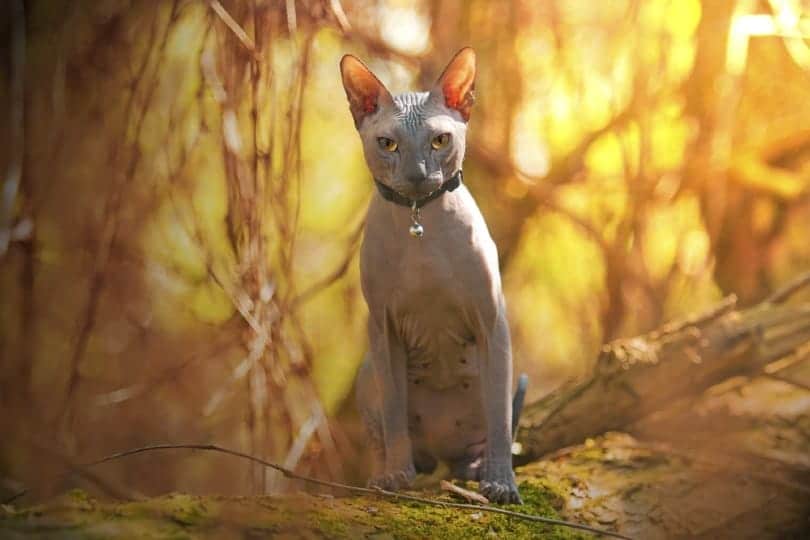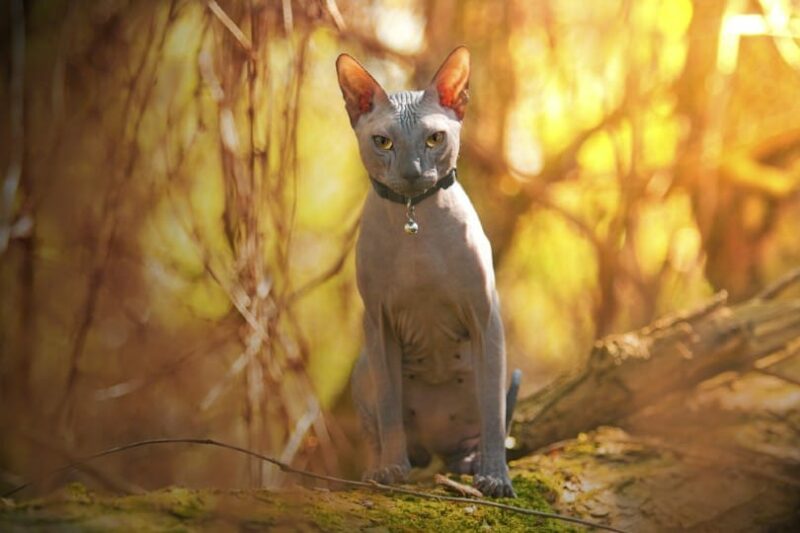Click to Skip Ahead
The iconic Sphynx cat has taken the world by storm and is one of the most sought-after and famous cats today. It’s no wonder that this hairless beauty gets so much credit, as they are incredible sights to behold and have terrific personalities.
If you’re a cat lover but you or a household member has allergies, you might be hoping that a Sphynx is your solution to the problem. But are these cats considered hypoallergenic? Unfortunately not. They are as allergenic as any other cat because they produce allergens which are not directly related to the amount of hair present. Let’s find out why.

What Triggers Pet Allergies in Sufferers?
Every animal with hair, fur, or feathers sheds microscopic dead skin cells called dander; even humans do. However, these don’t bother us a bit. But for some people, the dander coming from certain animals can be a recipe for trouble because it carries allergens. Some might have the misconception that allergies come from fur, which makes you automatically assume hairless animals don’t trigger allergies, but this is false.
Even hairless animals can trigger allergies. All cats produce proteins, called allergens, that can trigger allergies in susceptible individuals. The major cat allergen is named Fel d1 and comes from cat’s saliva and dander. Unfortunately, if you are an allergy sufferer, less hair is not a guarantee of less allergy symptoms. So, what makes a cat so different from other pets when it comes to allergies?
Allergies & Sphynx Cats
As explained, all cats produce a protein called Fel d1. This is the protein in their skin that many people react to. However, some might not realize that felines also carry this protein in their saliva and urine.
Sphynx cats aren’t considered hypoallergenic, but they’re probably as close as you’re going to get. While the allergic reaction a cat can trigger varies from cat to cat, studies show that unneutered male cats produce greater amounts of Fel d1. The production is not affected by the color or the length of the coat, but it may decline with age.
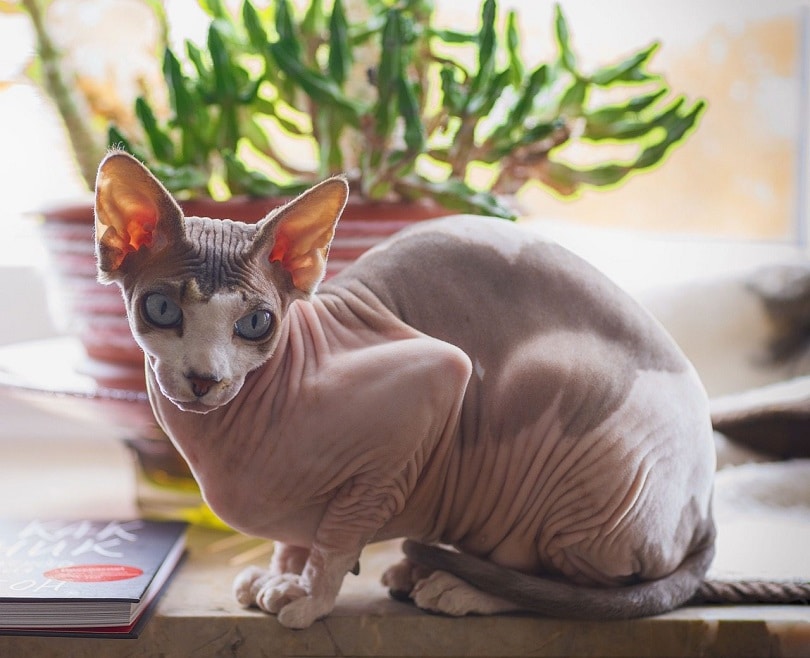
There Is No Such Thing as a Hypoallergenic Cat
As much as some might want to tote hypoallergenic breeds, there is really no such thing. That goes for both dogs and cats. However, cat allergies seem to be approximately twice as common as dog allergies.
There is an important concept when speaking about allergies, which is the allergy symptom threshold. Most people are allergic to more than one thing. The combined effect of all these allergens on your body is what causes allergy symptoms to manifest. If you manage to decrease the amount of other allergens that might be more easily eliminated, or even seasonal, it is possible that your allergy symptoms will disappear because the allergens are kept below the threshold necessary for them to be triggered.
Are All Sphynx Cats Hairless?
All Sphynx cats are hairless as a breed standard. The most hair a Sphynx cat can have is a light peach fuzz all over their body. But that doesn’t mean that all hairless cats are part of the Sphynx breed.
- Elf — The Elf cat is an ultra-rare hybrid between the Sphynx and American curl.
- Minskins — This breed has many influences, including the Munchkin, Burmese, Sphynx, and Devon Rex.
- Peterbalds — Often hairless due to a hair-loss gene, the Peterbald is a mixture of the Donskoy and Oriental Shorthair breeds.
- Donskoy — This cat is the Russian version of the Sphynx.
- Bambino — This short-legged cutie is a cross between the Munchkin and Sphynx.
Hairlessness might also occur spontaneously in furred litters.
Skin Care for Sphynx Cats
Don’t let the fact that this breed is hairless persuade you into thinking that they don’t require maintenance. Sphynx cats are by no means low-maintenance cats. What is unique about the breed is that their skin is remarkably similar to ours. Their flesh is porous, producing sweat and oils.
Because of their specific care regimen, you need to bathe your Sphynx regularly, approximately 2 to 3 times per month, but this should always be discussed with your vet. You have to wipe down their skin lightly at least once a day. It’s best to use chemical- and dye-free wipes to prevent skin irritation.
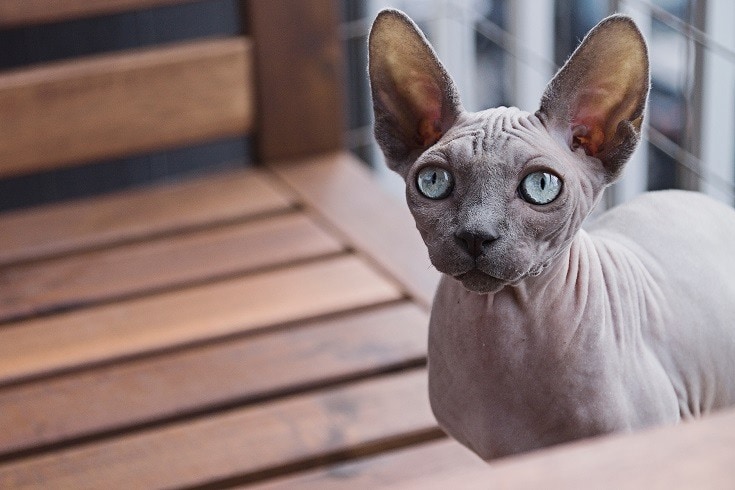
Skin Issues for Sphynx Cats
Because of their hairlessness, they can run into a few issues.
- Sunburn — Sphynx cats love sunbathing, but they have no hair to protect their skin and therefore they are susceptible to the damaging effects of sunlight.
- Excessively Oily Skin — If you over-bathe your Sphynx, it can cause highly oily skin. Remember to wipe down your Sphynx daily, but they will only need a full bath once a week at most.
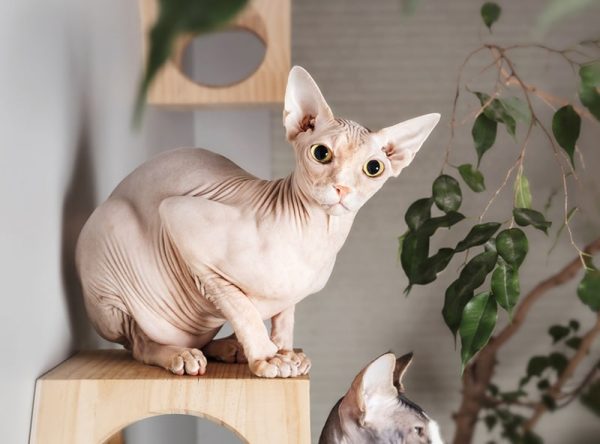
Owning a Sphynx Cat
Even though the concept of a hair-free cat might strike your fancy, you need to make sure you’re equipped to take on the challenges of the breed.
- Sphynx cats can still trigger allergies.Sphynxes can still cause reactions in those who are allergic to cats.
- Sphynx cats love attention. If you like the relaxed, non-committal approach that some cats have toward their owners, this isn’t the cat for you. Sphynxes are incredibly playful and affectionate creatures. They want to be the center of your world most of the time. So, make sure you have time for lots of extra cuddles and romp time.
- Don’t skimp on skincare. You can’t ignore the daily needs of the Sphynx. Just as important as clean, oil-free skin is in your everyday regimen, the same goes for your Sphynx. Wipe down your Sphynx every day with a moist cloth or scent-free baby wipes.
- Sphynx cats have significant grooming needs. Grooming is no joke with this breed. You have to wipe them down, bathe them weekly, and moisten their skin to prevent drying or flaking. The entire process of skin care is time consuming on top of regular care. Make sure you’re up for the challenge.
Final Thoughts
If you’re an allergy sufferer, your doctor can help you understand your allergies and create a management plan for you. For a mild allergy sufferer, you may want to see if a Sphynx is the right companion for you. However, there is no guarantee that being a hairless breed means less allergy symptoms for you. Sphynx cats produce Fel d1 mainly in their saliva and sebaceous glands, so it’s likely that they will be no better than other cats.
- You might also be interested in: Sphynx Kittens for Sale in the USA
Featured Image Credit: Best dog photo, Shutterstock

